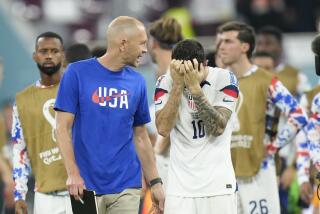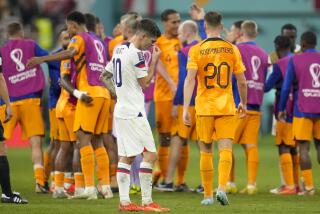Bush Welcomed by Dutch, Calls for East-West Unity
- Share via
LEIDEN, the Netherlands — President Bush, given a fond, friendly welcome Monday in the Dutch town that sheltered the Pilgrims before they reached America, saluted the lessening of tensions across Europe and said the West now has the opportunity “to integrate the Soviet Union into the community of nations.”
“The challenge we face is clear: We must work together toward the day when all of Europe--East and West--is free of discord, free of division,” Bush said, speaking from the pulpit of the Pieterskerk, a towering brick church dedicated in 1121.
In an address to the citizens of Leiden, a storybook town of small shops, narrow streets and the ubiquitous canals of coastal Holland on the North Sea, Bush offered an optimistic view of East-West relations on the next-to-last day of a 10-day trip to Poland, Hungary, France and the Netherlands. He is due back in Washington today.
“We will play a constructive role in Eastern Europe’s economic development, in the development of political pluralism--and in creating an international climate in which reform can succeed,” the President pledged, to an audience that included Queen Beatrix and her husband, Prince Claus.
“Improved relations with the U.S.S.R. reduce pressure on the nations of Eastern Europe--especially those on the cutting edge of reform,” Bush said, adding: “The new world we seek is a commonwealth of free nations working in concert, a world where more and more nations enter a widening circle of freedom.”
He said that “the Soviet Union has nothing to fear from the reforms that are now unfolding in some of the nations of Eastern Europe.” He pledged to follow “a carefully calibrated approach” in addressing the needs of the political and economic reform that has been the focus of his journey.
The visit to the Netherlands, during which Bush also conferred in The Hague, the seat of government, with Prime Minister Ruud Lubbers, was the first by an American President.
It was viewed as an opportunity to thank the Dutch for the political support they have provided in the North Atlantic Treaty Organization, supporting U.S. efforts to build up NATO military hardware at a time when much of Western Europe has balked.
The President’s arrival turned Leiden, the birthplace of the Dutch master Rembrandt, into a well-mannered carnival, with the blue-, white- and red-striped Dutch flag displayed with the American flag throughout the town, local residents lining the streets and small knots of demonstrators mixing their protest signs with less-political messages.
Thus, one group attacked funding for the anti-Sandinista rebels in Nicaragua, another criticized the President’s anti-abortion stand and another banner stretched across his motorcade route read “Buy Your Wood Shoes Over Here, Mr. President.”
“We are a small country, but we do occupy ourselves with a lot of problems in the whole world,” said a Dutch tourist office aide.
Leiden, which its mayor, G. H. Goekoop, said lies “in the middle of the world--between Amsterdam and Rotterdam, London and Berlin, Washington and Moscow,” has a history to match the message of the President’s address.
In 1609, the Pilgrims settled here in their flight from religious persecution in England. They remained until 1620, when they sailed to the New World.
“We believe that the American reality began right here, began when the Pilgrims asked for refuge,” the mayor said in his introduction of Bush.
It was in Leiden that the United Provinces of the Netherlands were founded in 1579, becoming the first democratic form of government here. And its bill of rights, written in 1609, led it to become a haven for political refugees--a reputation it holds to this day.
Refuge From Nazi Occupiers
During World War II, Bush pointed out, “behind these walls above the rafters, Resistance fighters, university students, took refuge from the forces of (Nazi) occupation and found safe haven in this church.”
The dramatic history of the church fed the emotion of the moment, as did the brief recital by the Bach Chorus of Holland and the Amsterdam Chamber Orchestra of the J. S. Bach cantata “Softly flow with gentle murmurings, you rippling waves,” a unique introduction for a presidential speech on East-West relations.
The President, who has grown increasingly optimistic in his remarks about Eastern Europe and the Soviet Union as his trip progressed, told his audience here that “today, as when the Pilgrims left this city, a new world lies within our reach.”
“Our hope is that the unnatural division of Europe will now come to an end--that the Europe behind the wall will join its neighbors to the West, prosperous and free,” he said.
Bush’s 25-hour visit to the Netherlands was marked by the usual tight security surrounding the President overseas. Dutch law strictly forbids carrying weapons, and the Secret Service depends heavily on a large, hidden arsenal to provide protection.
Referring to the possible discrepancy between Dutch law and Secret Service behavior, one Dutchman said when asked about the agents’ weapons: “We haven’t asked, and we don’t want to know.”
Dutch officials seemed bemused by Bush’s mammoth motorcade, with its three limousines and squadrons of staff vans, which snaked through narrow, cobblestoned streets at a fraction of its usual speed.
The reason was soon clear: Only hours after Bush’s entourage roared out of the medieval courtyard of the Parliament building in The Hague, Lubbers decided it was time to head home as well.
The Dutch leader walked out the door of his office accompanied by exactly two aides. When four young men on the sidewalk called to him--”Hey! Mr. Lubbers!”--he ambled over for a chat.
Then, still unprotected by any visible security, he walked across the street, got into his car and went home.
More to Read
Get the L.A. Times Politics newsletter
Deeply reported insights into legislation, politics and policy from Sacramento, Washington and beyond. In your inbox twice per week.
You may occasionally receive promotional content from the Los Angeles Times.










